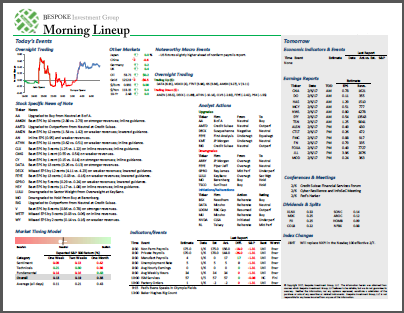See what’s driving market performance around the world in today’s Morning Lineup. Bespoke’s Morning Lineup is the best way to start your trading day. Read it now by starting a two-week trial to Bespoke Premium. CLICK HERE to learn more and start your trial.
“We must guard against the acquisition of unwarranted influence, whether sought or unsought, by the military-industrial complex. The potential for the disastrous rise of misplaced power exists and will persist.” – Dwight D. Eisenhower, 1/17/61
Below is a snippet of commentary from today’s Morning Lineup. Start a two-week trial to Bespoke Premium to view the full report.
It’s not a pretty morning for risk assets as Asian stocks, specifically China, were down sharply overnight, and Europe is down sharply this morning after ECB President Lagarde followed the lead of US central bankers when she noted that rate cuts aren’t likely to start until the Summer and UK inflation came in higher than expected. Here in the US, it’s a busy day of economic data. Retail Sales and Import Prices were just released, and they both came in higher than expected. On the docket, we have Industrial Production and Capacity Utilization at 9:15 and then Business Inventories and Homebuilder Sentiment at 10 AM.
When comments like the above are made today, the people making them are often written off by the mainstream as candidates being on the fringe, but President Dwight D. Eisenhower made the statement above as part of a nationally televised farewell speech from the Oval Office when his approval rating was just under 60%. Eisenhower’s concerns stemmed from the fact that after multiple major wars, the US defense industry was becoming a much larger share and player within the US economy, and he was pointing out that as its size grew, so too would its influence.
During Eisenhower’s last year in office (1960), total US defense spending, according to the World Bank, was $47 billion. Within 16 years, defense spending had doubled, and just six years later, it had more than doubled again to over $220 billion. Under Reagan, spending steadily increased and reached a short-term peak in 1990 at $325 billion. For the remainder of George H. Bush’s term through most of Clinton’s entire time in office, total spending actually drifted lower but then surged exponentially after 9/11. Spending then generally declined for most of Obama’s time in office and then ramped back up again after Trump came into office (“When I took over our military, we didn’t have ammunition”). As of 2022, the latest year of available figures, total defense spending in the US reached $877 billion, or more than 18 times the level during Eisenhower’s last year in office.
While it may look as though defense spending has only become a larger influence on the US economy since Eisenhower left the Oval Office for the last time, when measured as a percent of GDP, defense spending has generally been on the decline. During Eisenhower’s last year in office, total defense spending equaled about 9% of GDP, and through the decades steadily declined to a low of 3.09% of GDP in 1999 during Clinton’s second to last year in office. Again, spending ballooned as a percent of GDP during George W Bush’s Presidency after the 9/11 attacks, but then started to decline again after Obama came into office. While total dollar-spending surged after Trump came into office, as a share of the economy, the increase looks much more subdued.
In terms of the current US geo-political picture, it’s hard to remember a time when more fires were smoldering around the world, so you would think that it would be a great time for defense contractors. Based on the performance of the largest US defense contractors over the last year, though, that has hardly been the case. The chart below shows the one-year performance of the five largest defense contractors (market cap greater than $50 billion), and during that time, TransDigm (TDG) is the only one that is outperforming the S&P 500. Of the remaining four, two are up less than 4% while Boeing (BA) is down over 5% and RTX is down over 13%. BA is facing its own issues as the company tries to get its act together, but for the other companies rising geo-political instability hasn’t necessarily been good for their stocks.
Sign up for a two-week trial to Bespoke Premium to continue reading more of today’s macro analysis.




